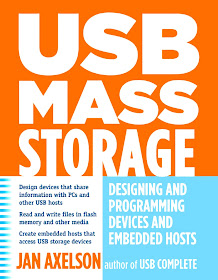 |
USB Mass Storage Designing and Programming Devices and Embedded Hosts Jan Axelson Fuente: Jan Axelson's Lakeview Research For: program listings, Code, List of corrections. Reseña A USB device controller enables a mass-storage device to share its data with other computers. For example, a data logger can collect data in the field and then connect to a PC, where an application reads the data from the logger’s storage media. Or a robot can attach to a PC to receive a file containing configuration data to use in robotic tasks. |
| Flash-memory cards provide convenient storage for many small systems. Other systems function as USB hosts that can access files in off-the-shelf USB flash drives and hard drives. If you’re involved with designing or programming devices that incorporate a USB mass-storage device or host interface, this book will help you get your projects up and running. You’ll also find the book useful if you’re designing or programming devices that use flash-memory cards for data storage, whether or not the devices have USB interfaces. Un controlador de dispositivo USB permite a un dispositivo de almacenamiento masivo compartir sus datos con otros ordenadores. Por ejemplo, un registrador de datos se pueden recopilar datos en el campo y luego se conectan a un de PC, donde una aplicación lee los datos desde medios de almacenamiento del registrador. O un robot puede conectar a un de PC para recibir un archivo que contiene los datos de configuración para utilizar en tareas robóticas. Tarjetas de memoria flash proporcionan un almacenamiento conveniente para muchos sistemas pequeños. Otros sistemas funcionan como hosts USB que pueden acceder a los archivos en unidades flash off-the-shelf USB y discos duros. Si usted está involucrado con el diseño o la programación de dispositivos que incorporan un dispositivo de almacenamiento masivo USB o interfaz de host, este libro le ayudará a conseguir sus proyectos en marcha y funcionando. También encontrará el libro sea útil si usted está diseñando o dispositivos que utilizan tarjetas de memoria flash para almacenamiento de datos de programación, si los dispositivos tienen interfaces USB. |
| INDICE |
|
| Consulta el Libro (6 MB) por: |
| Para los que usan Gestores de Descarga |
http://adf.ly/NWlji
http://adf.ly/NWljj
http://adf.ly/NWljk
http://adf.ly/NWljl
|
INDICE GENERAL |
|
gracias y feliictaciones comentando casi despues de un año felicitaciones sigue adelante
ResponderEliminarEs verdad lember leigue sos el 1º en comentarios. Gracias por tu apoyo.
ResponderEliminargracias profe y siga adelante casi no comentocomo muchos pero tus aportes son valiosos
ResponderEliminarQue paso profe, porque ya no sube mas libros?
ResponderEliminarEspero que vuelva a subir como antes.
Se le extraña.